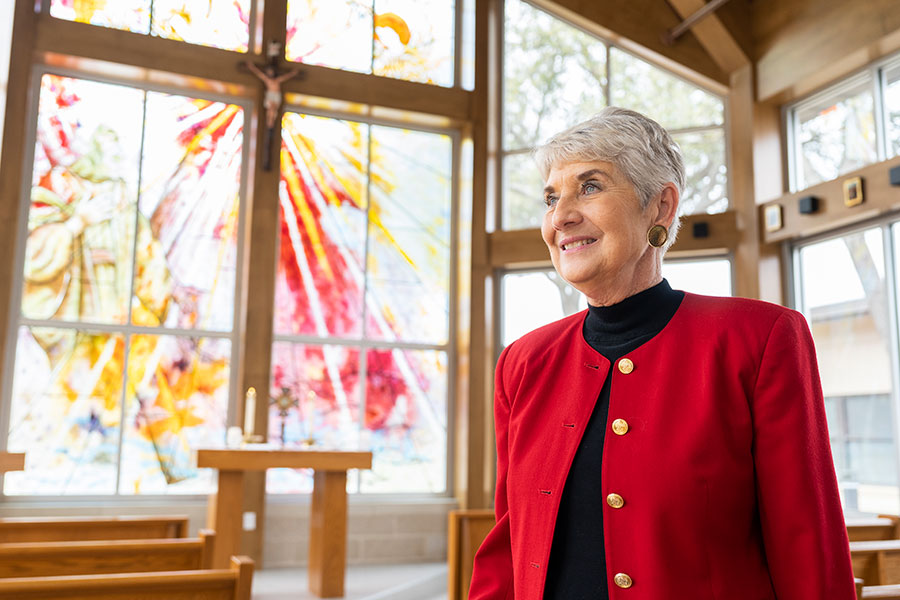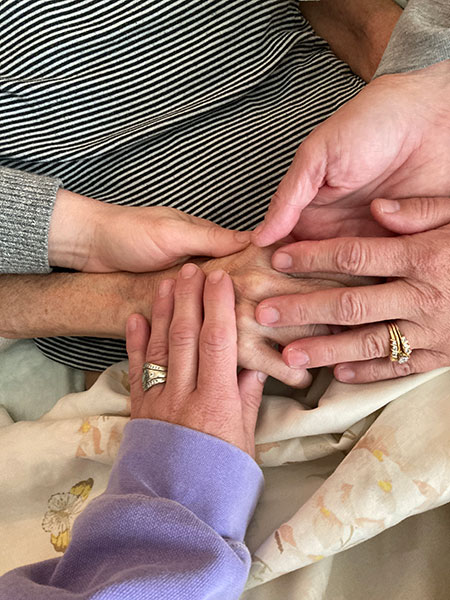Memories of hope: when a loved one suffers with Alzheimer's disease

Cheryl Harding, president and CEO, and Dr. Janice Knebl (right), medical director, pose in front of the James L. West Center for Dementia Care on May 18, 2023. The statue is of philanthropist James L. West, to whom the center was dedicated. (NTC/Juan Guajardo)
Bill Hall had an uncanny sense of direction. Relying on his inner GPS, the director of accounting at Lockheed Martin always knew where he was going and never got lost.
That suddenly changed while on vacation in South Carolina with his wife, Rose. The couple got separated during a bike ride and Bill was late returning to their hotel.
“A half hour later he pulled up and told me he couldn’t figure out where he was,” recalled Rose, longtime development director at St. Andrew Catholic School in Fort Worth. “I didn’t think much about it at the time.”
Concern grew after a second incident at work. The accounting professional was in the middle of a presentation when he had to stop.
“He couldn’t express himself,” his wife explained, recounting the episode. “He couldn’t remember the names of co-workers he’d known for 20, 30 years.”
Originally attributed to stress, the lapses in short-term memory were later diagnosed as early-onset Alzheimer’s disease. Bill Hall was only 56 years old.
A type of dementia usually affecting people older than 65, Alzheimer’s is a progressive disease that eventually limits a person’s ability to carry on a conversation and respond to their environment. Most people live four to eight years after diagnosis, but some patients survive as long as 20 years depending on health and lifestyle factors.
An estimated 6.7 million Americans age 65 and older are living with Alzheimer’s in 2023.
In the years that followed her husband’s diagnosis, Rose Hall relied on an Alzheimer’s Association support group, family, and her faith to meet the demands of caregiving. Like thousands of others coping with devastating memory loss in a loved one, her first thought was, “How am I going to do this?”
Members of a support group shared their knowledge about the disease with her.
“Other women told me what helped and what didn’t,” said the mother of three grown sons. “One piece of advice was don’t fight with your husband about things he doesn’t remember. There’s no sense in arguing with someone whose memory is compromised.”
Her Catholic faith was also a consolation.
“Every day I prayed for more patience,” confessed the St. Andrew parishioner. “When you’re dealing with someone with Alzheimer’s, you can imagine how much patience you have to have. I tried to see the disease from his side. Could I be more understanding? Could I be more kind?”
Finding holiness

It’s not uncommon for a parishioner to share news of their own or a family member’s diagnosis with dementia or Alzheimer’s with Father John Robert Skeldon. Dealing with progressive illness is never easy but the rector at St. Patrick Cathedral encourages people to be magnanimous when faced with life’s hardships.
“When someone is going through a long-term mental decline like Alzheimer’s, there’s going to be moments when family members want to throw up their hands to the sky and say ‘why me’ and that is certainly valid,” he said. “But it also calls for magnanimity — largeness of soul. This is the walk you’re on so try and find the holiness in the situation.”
On days when a caregiver may feel frustrated or impatient, “There are lessons to be learned,” Fr. Skeldon advised.
One of the core aspects of the Catholic faith is the Church as community. In a transient society where family members often move away from older relatives, a faith community can serve as a source of strength, comfort, and support during illness.
“The communal element of religion is important, particularly when someone is literally losing their mind, not only for the caregiver but the person with Alzheimer’s,” the priest continued. “Those old practices, if someone was raised in the tradition of faith, may speak to the person beyond what we can see. When they hear the Lord’s Prayer or Hail Mary, it may be calming because it touches someplace deep inside that’s familiar.”
When people share their struggles of chronic or life-threatening disease with him, Fr. Skeldon offers consolation by reminding them “what happened on the cross is a real thing.” Jesus experienced the breakdown of the body and flesh. He felt anguish, forlornness, and forsakenness.
Watching someone you love lose their mental faculties is heartbreaking but it is a shared grief.
“We don’t have a God that is distant or unknowing of what it is to be a human being,” he explained. “He took on every form of human existence — even death on the cross.”
We focus on joy

For the past four decades, Dr. Janice Knebl, DO, has helped older Americans navigate aging and memory loss. She’s worked as medical director at the James L. West Center for Dementia Care since the nonprofit opened in 1993.
Partnering with the First Presbyterian Church of Fort Worth, Eunice West founded the memory care facility to honor her late husband and philanthropist James L. West who died from Alzheimer’s. Guided by a faith-inspired philosophy of life-enhancing comfort rather than cure, the center offers residential and respite care, a day program, and education classes geared toward helping families understand and cope with the disease.
The need for memory care resources is expected to soar as more baby boomers — Americans born between 1946 and 1964 — become senior citizens.
“Cases are going up because one of the greatest risk factors is aging,” Dr. Knebl pointed out.
Identified by German physician Dr. Alois Alzheimer in 1906, profound memory loss was once described with words like senile or disregarded as simply getting older.
“A lot of times, older adults thought they were going crazy — losing their mind. They thought they had a mental illness,” the geriatric researcher suggested. “But it’s not a mental illness. It’s a disease.”
Early diagnosis is key to maintaining a quality life for as long as possible. Along with legal and advanced care decisions, it allows a patient to make lifestyle changes that may benefit cognitive function.
“Having a diagnosis enables us to treat patients and give them options for different therapies,” Dr. Knebl added. “They can make choices, take control, and share the journey with family and close friends.”
Dr. Knebl’s dedication to geriatric medicine is rooted in childhood. Born into a Catholic Polish/German immigrant family, she grew up across the street from her grandparents, godparents, “and a lot of older adults.”
The value of medical intervention also came early in life. A blood deficiency as a young girl meant weekly doctor appointments for blood draws and injections.
“I decided I wanted to be on the other side of the needle,” said the Philadelphia native, explaining what made her consider a career in medicine.
After graduating from medical school, the osteopath trained at a Jewish home for the aged — a decision that reinforced a desire to care for senior citizens. Many residents were survivors of the Holocaust.
“The center specialized in caring for people with dementia so that just appealed to me,” Dr. Knebl continued. “People with dementia are so vulnerable and there’s so much misunderstanding about them.”
Alzheimer’s has no cure but the seasoned doctor maintains a positive attitude for her patients. Treatment is a team effort involving social workers, nurses, and psychologists.
Meeting someone’s spiritual needs is also essential.
“Faith is part of us so it’s important to know about that person’s faith community and how can they [can] stay connected,” Dr. Knebl observed. “Maybe they can’t go there [to attend services] but we can bring that faith community to them.”
Clergy often visit patients, and a Christian service is held each Sunday in the chapel.
Research indicates personal prayer, connection to a church, and faith can offer peace, hope, and reassurance to people with early-stage Alzheimer’s. Cognitive decline is slower for those with a higher level of spirituality and religious practices.
The St. Andrew parishioner considers caring for Alzheimer patients a privilege.
“We try to help people have some hope — not hope for being normal but hope for having a quality life,” the geriatrician said. “What I love about being at the West Center is we focus on joy. We control what we can and give the rest of it up to God.”
God has a plan

The family of Kathy Cribari Hamer Beck relied heavily on their faith when she was diagnosed with Alzheimer’s in 2019. An award-winning journalist and photographer, the mother of five wrote articles for the North Texas Catholic that were both creative and informative. Her ability to find holiness in the ordinary and then share it in a family life column was recognized by the Catholic Press Association for excellence numerous times.
Her daughter Julie Stahl first noticed a change in her mother’s witty, vivacious personality after a broken leg required surgery in 2015.
“She made it back from that, but we felt it knocked something loose in a way,” Stahl said. “It progressively got harder and harder to see the old Mom.”
The lapses in memory were caused by a form of Alzheimer’s made worse by vascular dementia — a combination that killed both Kathy’s mother and sister. Cognitive decline in the once-skilled communicator was rapid.
“It caused tiny strokes in the brain, so we noticed the changes quicker,” Stahl added. “We knew something was different and she eventually shared the diagnosis with us.”
Social distancing, caused by the COVID-19 pandemic, compounded her mother’s confusion.
“We didn’t want to make her sick so we really couldn’t come over. We’d bring meals and said a quick hello and goodbye,” remembered Stahl, a Nolan Catholic and TCU gradute. “She didn’t understand that very well.”
During visits, the family shared memories without using the words “remember when” to avoid frustrating her.
“If you did it the right way, she’d clap and laugh and say that was such a good time!” the caregiver explained.
If things didn’t go well, the siblings consoled each other and discussed what they could do better the next time.
When it became necessary to place Kathy in a residential facility, the longtime St. Andrew parishioner watched Mass on television. Stahl brought Communion until her mother was too sick to receive the host. Kathy, once a yearbook coordinator at TCU, died at the age of 74 after two and a half years of illness.
Stahl copes with the loss of her mother by believing God has a plan.
“My sister Meredith and I just look at each other and know Mom is whole now. She’s young and vibrant like everybody remembers her,” the grieving daughter said with assurance. “We think about the happiest times in her life and picture her hugging Jesus.”
